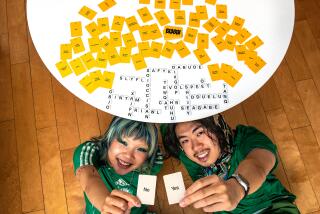CULTURE WATCH : Defining ‘Gantelope,’ ‘Erne’: It’s All in the Game
- Share via
Before the spate of word games marketed at $20 to $40, there was a game requiring just pencils, paper and a dictionary. Created in the 1930s by French poet Andre Breton, this dictionary game has been passed along by students and others on limited budgets.
It can be played by three people or a dozen, but about six works best. Each round, a player chooses a word that is read aloud and spelled. Players familiar with the word sit out the round on the honor system. (Yeah, right.)
Next, each player writes down a likely sounding definition on a small piece of paper. The bogus definitions are collected by the chooser. All definitions, including the correct one, are read aloud. Players try to decide which is legitimate. Scoring is negotiable.
The dictionary has obscure, archaic, scientific or professional terms, as well as many foreign words, including plenty of good old Latin. Flipping at random one might quickly find erne , trismus and gantelope . Creative souls may pick up a word like gantelope and run with it. In reality, it’s an obsolete word meaning glove or gauntlet.
Most dictionaries include literary characters and allusions like “Old Man of the Sea.” Sound familiar? But is it a poisonous jellyfish or a short novel by Ernest Hemingway? Neither; it’s a character from “The Arabian Nights.”
More to Read
The biggest entertainment stories
Get our big stories about Hollywood, film, television, music, arts, culture and more right in your inbox as soon as they publish.
You may occasionally receive promotional content from the Los Angeles Times.









